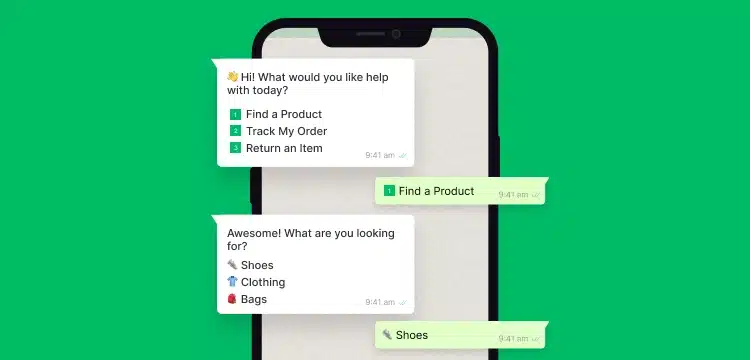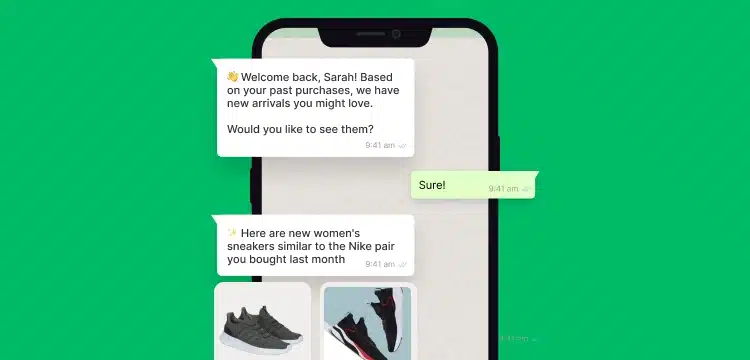How Chatbot for Retail Industry Make Shopping Personal and Enjoyable?
With online shopping continuing to grow rapidly global retail sales are expected to touch $32.8 trillion by 2026, the retailers are looking for smarter with more personal ways to connect with shoppers. One of the most promising tools in this space is the chatbot for retail industry.
In this blog article, we’ll walk through how these chatbots for retail are changing the game for businesses, making shopping more comfortable, more enjoyable, and better tailored to what customers really want.
Ready to Give Your Online Store a Smart Helper?
Learn how chatbots for retail can truly boost your business.
- What Exactly are Retail Chatbots?
- Role of WhatsApp Chatbot in Retail Industry
- Role of WhatsApp Catalogue and WhatsApp Store in Retail Industry
- Types of Chatbots for Retail
- Tips and Best Practices for Chatbots in Retail
- Creating a Supportive Shopping Chatbot for Your Website
- Importance of Retail Chatbots
- Conclusion
- Frequently Asked Questions
Shortcuts: ✂️
What Exactly are Retail Chatbots?
Retail chatbots are virtual assistants that help answer common questions, recommend products, assist with browsing, and even encourage customers to explore more options—all while keeping the conversation two-way and easy-going.
A few eye-opening numbers on chatbot usage:
- 44% of shoppers appreciate how helpful retail chatbots are in finding product info before buying.
- 40% don’t mind whether they’re talking to a person or a bot—if they get the help they need.
- Chatbots for retail can handle up to 80% of common tasks and questions, easing the load on customer support teams.
Types of Chatbots for Retail
Most chatbots for retail fall into one of two groups, each built to suit different needs.
1. Rule-Based Chatbots

These retail chatbots follow a set of instructions or decision paths to help customers. Think of them like a helpful flowchart—if a customer asks about store hours or return policies, they’ll always get a clear, consistent answer.
They’re not built to “learn” or adjust based on previous conversations, but they’re great at answering FAQs and handling predictable questions.
Consider this: your team is swamped with the same questions day in, day out. A rule-based chatbot for retail can step in, answer those common queries 24 X 7, and free up your staff to handle the more unique, complex requests.
Other benefits of using rule-based retail chatbots in business:
- Scalability: They handle a flood of queries during busy seasons like Diwali sales or year-end offers.
- Customization: You decide exactly how they respond—keeping everything on-brand.
- Cost Savings: Fewer repetitive queries for live agents to handle means lower support costs.
- Quick Setup: Because they work off fixed rules, they’re easy to launch and run.
2. Smart, Learning Chatbots

These retail chatbots take things up a notch. They understand natural conversation, learn from every interaction, and get better over time. They’re especially handy when your products need more of a personal touch.
Let’s say you run a skincare brand. A smart chatbot for retail industry can ask about skin type, suggest ideal products, share how-to’s, and recommend combos—turning what could be a boring product list into a mini personal shopping experience. Implementing AI in sales allows brands to automate these interactions, improve customer engagement, and ultimately drive higher conversions.
Some of the biggest advantages here include:
- Always getting better: These retail chatbots learn as they go, improving how they help customers.
- Insightful data: They pick up on patterns, likes, and dislikes, giving you valuable feedback to improve sales.
- Tailored experiences: From smart recommendations to loyalty rewards and special offers, these bots make every shopper feel like the centre of attention.
Role of WhatsApp Chatbot in Retail Industry
In today’s high-paced digitized retail world, connecting with your customers fast and comfortably is a main key. So, WhatsApp Chatbot now is a powerful tool.
By automating the customer interactions on a WhatsApp platform, where customers are available, most of their time, retail owners can majorly improve the shopping experience and simplify their operations.
Let us unleash here how a WhatsApp Chatbot is helpful in the retail industry:
- Instant Customer Service: A WhatsApp Chatbot can instantly answer frequently asked questions about store hours, locations, stock availability, or return policies 24 X 7, making human staff free from such basic tasks.
- Improved Product Discovery: WhatsApp Chatbot supports the customers for required product details, their specifications, or even get personalized recommendations based on their choices or earlier purchases.
- Simplified Order Tracking: Customers can easily check out with WhatsApp Chatbot for their order status and have real-time updates inside the chat.
- Driving Sales & Promotions: With right opt-in, the WhatsApp Chatbot can send personalised alerts about, new arrivals, sales or abandoned carts, directing customers back to purchase.
- Simplified Purchases: While complex transactions might still go to a website, a WhatsApp Chatbot can guide users via the initial steps of placing an order or even complete simple purchases directly in the chat if integrated with e-commerce and payment features.
- Collecting Feedback: A WhatsApp Chatbot can automatically send the customer satisfaction surveys upon their purchases to collect valuable customer feedback quickly.
- Lead Generation: WhatsApp Chatbot can initially assess or evaluate the leads to qualify them before handing them over to the sales associates. Integrating lead routing Salesforce features ensures these qualified leads are directed to the right team members without delays, improving response time and conversion potential.
Using a WhatsApp Chatbot permits retail businesses to offer faster, more accessible service, personalize interactions at scale, and drive engagement with sales conversions in a competitive market.
Role of WhatsApp Catalogue and WhatsApp Store in Retail Industry
WhatsApp Catalogue
The WhatsApp Catalogue really acts as a mobile storefront right inside the WhatsApp chat interface. Retailers can upload their products or services with clear product images that can be compressed further without reducing the quality through image resizing tools, necessary product descriptions, and pricings, organizing them into collections for easy searching by customers directly from the business’s profile or within a WhatsApp conversation.
This feature makes product discovery extremely comfortable for shoppers, removing the need for them to leave WhatsApp and referring a separate website or app for initial search. It makes selling and buying much easier.
WhatsApp Store
Building on the Catalogue, the WhatsApp Store, also as a leading feature allows retailers to create a more integrated shopping experience.
This can involve functionalities like adding items to a cart from the WhatsApp Catalogue, delivering order summaries, and even offering payment directly within or linked from the WhatsApp chat environment.
For retailers, the WhatsApp Store helps closing the loop from discovery to purchase within a familiar messaging interface. It simplifies the buying process, declines prospective drop-off points by keeping the customer on WhatsApp, and allows automated communication for order confirmations, shipping updates, and delivery alerts, leading to a seamless and more satisfying customer journey.
See the Difference a Smart Assistant Makes for Shoppers
Get started building your perfect retail chatbot now…
Tips and Best Practices for Chatbots in Retail
Certain practices help for getting assured for the successful implementation of retail chatbots.
Here are some:
1. Define clear goals and objectives
Prioritize a fair understanding of your business objectives and identify key customer pain points. With this knowledge, customize your chatbot to address them effectively.
Don’t just implement a chatbot because everyone is going for it.
2. Craft the right chatbot persona
Consistency in user experience is one of the key building blocks when building trust and brand loyalty. This simply means that even your chatbot persona should align with your brand’s tone and values. If your brand’s personality is funny and playful, making your chatbot like that; your customers will love it. Learning how to use AI agents effectively can help brands design chatbot interactions that feel more natural and aligned with their voice.
3. Select the right service provider
When selecting the right service provider, you must consider client reviews and portfolios.
With WebMaxy’s industry-leading expertise, many years of experience, highest compliance standards, and global connections, you make sure that your chatbot development is done by the perfect experts from the market.
Creating a Supportive Shopping Chatbot for Your Website
Let’s walk through how you can build one of these smart helpers for your online store.
First, figure out what your online helper should focus on. What jobs should it do? Think about the tasks that would make shopping easier for your customers.
Should it be all about:
- Suggesting items people might love based on what they’re Browse?
- Giving a friendly nudge about items left behind in their basket?
- Helping folks track their delivery or handling questions after they’ve made a purchase?
- Simply being there to quickly answer everyday questions about your products or policies?
- Maybe a little bit of all these things working together?
Next, select the right tools to build it. You’ll need a system that’s smart enough to understand what customers type (even if it’s not worded perfectly), can do things automatically behind the scenes, and can quickly look up the latest info like what’s in stock. Businesses that rely on WordPress web development services often benefit from tailored solutions that integrate these intelligent features directly into their sites.
Look for tools that are made specifically for creating these kinds of retail helpers. Some clever systems can even decide on their own if they should follow a standard response or have a more free-flowing chat, which helps them feel much more like talking to a person.
The people setting it up can often just tell the system what to do in plain, simple words, making it easier to create a smart helper that really keeps up with the conversation.
Now, put your helper together.
Design how it “talks”: Plan out the conversations so they feel easy, welcoming, and natural – like talking to a friendly person in a shop. Since shoppers might be in a hurry, make sure your helper’s replies are:
- Easy to understand right away.
- Short and to the point.
- Clearly tell the customer what they can do next.
Teach it using real customer questions: Show the helper examples of questions people have asked your business before. This is how it learns and gets better at understanding common retail questions. It’s also good to teach it local ways of speaking and make sure it can chat in different languages if your customers need that.
Have it reach out and add personal touches: Your helper shouldn’t just sit and wait for questions. It can be proactive and offer help before being asked by:
- Sending gentle, friendly reminders about items someone left in their cart.
- Customer must know by notification or alert that their required item is back in stock now.
- Suggesting other products, they might be interested in based on what they’ve looked at or bought before.
Connect it to your shop’s systems: Link your helper up with the tools you use every day to run your online store. This means connecting it to things like your e-commerce platform (like where you list your products), the systems you use to manage orders and handle shipping, and your customer contact lists. This connection is crucial so the helper can give accurate prices, know exactly what’s available, and provide reliable order tracking details right away.
Make sure it can pass you to a person: There will always be questions or situations that are too complicated for a helper to handle alone – maybe a complex return or a tricky order issue. When this gets done, your helper must smoothly handle that conversation over to one of your human teammates, sharing all the chat details so the customer need not to repeat again.
After you’ve developed it, it’s required to try it, and make it better, also keep refining it. Your online helper gets smarter and more helpful the more it talks to real customers. Keep a nice watch on how people are doing with it to see what’s working and what is not.
Consume the feedback to make fixes and improvements so it knows better and is more efficient by time.
Finally, put it to work on your website and keep watching it. Ongoing monitoring is important upon you helper gets in live. Check things like:
- How often are customers talking to it?
- Is it successfully answering their questions and helping them solve their issues?
- Is it playing a role in helping people complete purchases or reminding them to finish checkout?
Importance of Retail Chatbots
A chatbot for retail industry is bringing a bit of that familiar, helpful touch to the vast world of online retail. They don’t just spit out pre-written answers; the smarter ones can make you feel like you’re getting individual attention.
If you’re curious about a specific item, the helper can instantly bring up all the details, show you other similar choices, or even suggest things that would go nicely with it, just like picture finding the perfect matching scarf for that dress you’re considering.
It really sounds like having that knowledgeable shop assistant who knows every single item, and is always on standby, ready to help you instantly, no matter the time of day / night. Because they’re available around the clock. This means you get the help you need at every required moment. So, you are completely free from to wait until the store’s daily business hours.
Beyond the initial search, these digital helpers also make seamless way for the parts of online shopping that can sometimes be a hassle. Need to check if your order has shipped? Thinking about the return policy? Instead of digging via pages of FAQs or waiting for an email, a quick chat with a chatbot for retail industry can get you the answer immediately.
This instant support helps build trust and makes the post-purchase experience very less stressful.
Chatbots for retail also play a quiet but powerful role in helping businesses understand what shoppers are really looking for. Every question asked, every product explored, offers valuable clues about customer preferences, common issues, and popular items.
These insights are gold (along with valued feedback) for refining the customer journey.
And while these retail chatbots handle the common stuff efficiently, they free up the human team to tackle the tedious issues – those times when you need someone to really listen, empathize, or resolve a unique problem that needs human judgment.
So, the bots handle the volume and speed, and the humans handle the depth and empathy, leading to a more powerful and caring overall support system.
Okay, so we know retail chatbots are much needed smart helpers. But what’s truly interesting is how they change the feeling of shopping online. Think about walking into your favourite local shop where the staff know your name and even your style.
They may suggest something new based on what you bought last time or quickly help you find that certain item you’re searching for, making the whole visit feel personal and easy.
Conclusion
Ultimately, retail chatbots are becoming more than just automated tools; they’re evolving into integral parts of the shopping journey, making it faster, friendlier, more insightful for the business, and surprisingly personal for the customer.
To develop such chatbots for your retail business, you can consider WebMaxy as the best option for this type of requirement. You can drop us an email on info@webmaxy.co for the further assistance and queries.
Frequently Asked Questions
Retail chatbots are used across multiple channels, like websites, mobile apps, and social media platforms. They are expected to provide personalized assistance, answer the queries, automate processes, and drive sales.
The benefits of Retail Chatbots are classified as: for customers and Businesses.
Benefits for customers:
1. 24 X 7 Availability:
Retail Chatbots can offer instant support and answer questions around the clock, a tough aspect for businesses that operate outside of traditional business hours or serve a global customer base.
2. Personalized Experiences:
Chatbots for retail industry can customize interactions based on customer choices, browsing history, and past purchases, giving a more engaging and relevant shopping experience.
3. Faster Response Times:
Retail Chatbots offer instant answers and assistance, declining customer waiting times and improving overall satisfaction.
4. Convenient Self-Service:
Chatbots for retail allow customers to handle common tasks like checking order status, initiating returns, or searching product information independently.
5. Multilingual Support:
These Chatbots can be programmed to offer support in variable languages, expanding the reach of businesses to international customers.
Benefits for Businesses:
1. Reduced Costs:
With customer service automation inquiries and declining the need for human agents, chatbots can remarkably lower operational costs.
2. Improved Customer Satisfaction:
Retail Chatbots offer powerful and helpful support, leads to higher customer satisfaction and loyalty.
3. Increased Sales:
By giving product guidance, addressing queries, and guiding customers through the checkout process, chatbots can improve conversion rates and boost sales.
4. Improved Efficiency:
Chatbots for retail industry monitor redundant tasks, freeing up human agents to focus on more complex issues, improving overall efficiency.
5. Data-Driven Insights:
Chatbots for retail can collect valuable data about customer behaviour, choices, and pain areas, offering valuable insights for improving products and services.
6. Scalability:
Such Chatbots can easily enrich to monitor large volumes of inquiries, making them a suitable solution for all types of businesses.
7. Proactive Customer Service:
Retail Chatbots can actively reach out to customers with supportive data, offers, or recommendations, refining the overall shopping experience.
8. Omnichannel Support:
Chatbots for retail industry can integrate smoothly with other channels like email, social media, and phone, offering a unique customer experience.
Retail chatbots use AI technology to automate main parts of the shopping cycle. The integration of inventory systems and payment platforms with the offer of real-time support and individual assistance to boost the customer experience and sales improvement.
Chatbots in retail provide real-time customer support. They answer common queries about prices, products and availability, and return policies.
Adam Wilson
Adam Wilson comes with an experience of 12+ years in the IT industry. As a Customer Success Manager, he has been researching and trying to understand the customers’ behavior in different scenarios. He has also studied human psychology to relate it to the purchase journey of the customers. His published books on customer psychology and behavior have received many honors and awards from various enterprises.


